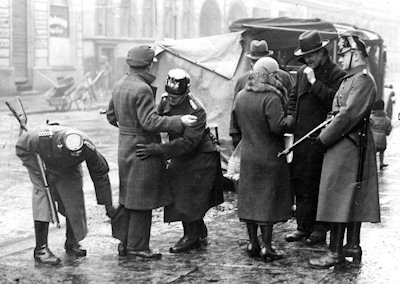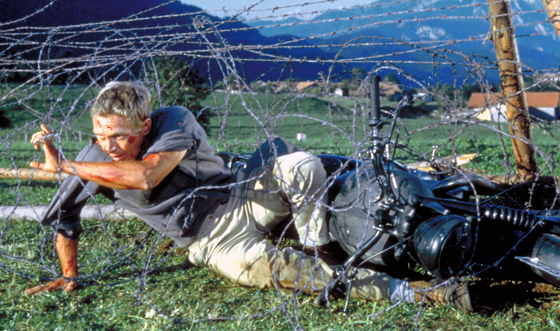
The near end of The Great Escape is one of the most tragic episodes in history. Most of the prisoners who tried to flee and who were captured were shot by Nazi Gestapo officers following shoot-to-kill orders to all “runners”.
The order came from Adolf Hitler himself. He was reportedly furious of the news of 76 Allies who broke out of a high-security camp Stalag Luft III. Of the 76 men, 50 were gunned down. Following the signing of the Geneva Convention, the atrocity was recorded as one of the worst war crime against Britain.
March 2014 is the 70th anniversary of the escape of the men. They made their escape by digging a tunnel on their way to freedom. The popular Hollywood film with stars Steve McQueen and Richard Attenborough was even made inspired by the escape.
There 76 Allied airmen who made their escape on March 24, 1944. Yet there were only three who safely made it back to Britain. The 50 men who were captured by ordered to their execution. They were told to take a break and relieve themselves before their drive back to camp. When they turned their backs, the men were shot by the Nazi Gestapo. Their dead bodies were then taken away for cremation.
Then Foreign Secretary and later on Prime Minister, Anthony Eden, heard of the news of the massacre of the men and ordered for the tracking down of the responsible Nazis. A team led by a detective from Blackpool tracked down the Nazis who executed the 50 men.
After the Allied victoriously defeated the Germans, the Nazis perpetrators of the execution of 50 airmen were dispersed all over Europe. Many of these had bore different identities. The team leader who spearheaded the task of tracking down the perpetrators was Detective Frank McKenna of Blackpool. He was also called Sherlock Holmes. He used to serve in the Bomber Command.
Eighteen months after the massacre of the 50 men, McKenna’s team started their investigation. However, they were at a dilemma on where to start because there were no clues left to the crime scene and there were no witnesses.
For McKenna, the mission was more than just orders and duty. It was personal. Two of his friends were among the 50 men shot. These were Flight Lieutenant Edgar Humphreys and Flying Officer Robert Stewart. The men were previously stationed at RAF Squires Gate in Blackpool.
His brother-in-law Howard Luck was also among the original group which planned on escaping at Stalag Luft III. However, he turned back because he ran out of time escaping.
The team has a “most wanted” list of the missing Nazis responsible for the mass execution. They started to look for leads. They researched on records from prison camp and record offices. While looking for the men, they uncovered atrocities of many Nazis as well.
They finally made an arrest when a guest with suspicious character alerted a Hamburg hotelier and tipped off the team. The guest, who pretended to be French, was Ernst Kah. His name is on No. 12 of the team’s “most wanted” list. He is the known head of the SS intelligence division. To lighten his sentence, he tried to cooperate with the team and gave them information of the names of the other Nazis and their whereabouts.

Some of the Nazis on the list were discovered in prisons under false identities. One disguised himself and worked for the U.S. Army. The unknowing Allies thought that he was “harmless” and gave placed him in the port of Bremen working as customs clerk. McKenna surprised Zacharias and arrested him during his shift at work.
Zacharias is responsible for the shooting of squadron leader Thomas Kirby-Green and Canadian flying officer Gordon Kidde. He is also accused of the rape and murder of an 18 year-old Czech receptionist who heard him beating a RAF prisoner.
Zacharias tried to escape from the custody of the United States but he was recaptured. McKenna found him at his home scampering to pack and leave town. When he was in England, he, again, attempted to flee digging his way out of jail. He was again recaptured.
Zacharias, who was found guilty and waiting for his final punishment gave McKenna a Rolex watch. He offered the watch as thank-you gift for being the “only one who has been really fair” to Zacharias. McKenna was said to be the only one who did not beat the Nazi. The watch is now worth £10,000.
McKenna also arrested Emil Schulz. He is said to be the one who shot the plot leader of the Great Escape, Flight Commander Roger Bushell. Bushell was played by Richard Attenborough in the Hollywood film about the men’s escape.
During McKenna’s investigation, he found out that Schulz only served little time with the Nazis. He also shot Bushell out of fear of being killed for disobedience. He was delivered his sentence and executed. McKenna secretly sent a message to Schulz’s widow.
The team also arrested Nazi Johannes Post who was said to be the ring leader of the executions and delighted in the act. By 1948, there were 44 Gestapo arrested. Thirty were tried, 17 were jailed while 13 were executed. Eleven still await trial while only 3 were acquitted.
However, it was not an easy task. The investigation took up two years. Over 100,000 interviews were conducted.
Frank McKenna was awarded with n OBE for his remarkable detective work. However, the mission of the team was not really that popular. He then returned to his original work as detective at Blackpool. He volunteered for the war, but being a detective, he was restricted to the job and was kept out of the battlefield.
When the Bomber Command began to experience heavy losses, they started to allow detectives like McKenna to enlist.
By 1941, the family had already had their share of loss. He and his wife had two sons. Terry, 9 and eldest, was killed when a car hit him. Ian, the couple’s second son, then a toddler said that his father never really recovered from the loss.